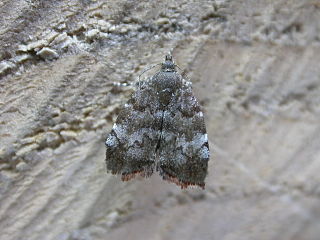
Urtica dioica, often known as common nettle, burn nettle, stinging nettle or nettle leaf, or just a nettle or stinger, is a herbaceous perennial flowering plant in the family Urticaceae. Originally native to Europe, much of temperate Asia and western North Africa, it is now found worldwide. The species is divided into six subspecies, five of which have many hollow stinging hairs called trichomes on the leaves and stems, which act like hypodermic needles, injecting histamine and other chemicals that produce a stinging sensation upon contact.

Urtica is a genus of flowering plants in the family Urticaceae. Many species have stinging hairs and may be called nettles or stinging nettles. The generic name Urtica derives from the Latin for 'sting'.

Choreutidae, or metalmark moths, are a family of insects in the lepidopteran order whose relationships have been long disputed. It was placed previously in the superfamily Yponomeutoidea in family Glyphipterigidae and in superfamily Sesioidea. It is now considered to represent its own superfamily. The relationship of the family to the other lineages in the group "Apoditrysia" need a new assessment, especially with new molecular data.

Anania hortulata, also known as the small magpie, is a species of moth of the family Crambidae found in Asia, Europe and North America. It was described, in 1758, by the 18th-century Swedish taxonomist, botanist, and zoologist, Carl Linnaeus.

Anthophila fabriciana, also known as the common nettle-tap, is a moth of the family Choreutidae first described in 1767 by Carl Linnaeus. The moth can be found flying around stinging nettles during the day.

Abrostola urentis, the spectacled nettle moth or variegated brindle, is a moth of the family Noctuidae. The species was first described by Achille Guenée in 1852. It is found in North America from Nova Scotia west across Canada to Vancouver Island, south to North Carolina, Missouri, Texas, Colorado and Oregon.

Allagrapha aerea, the unspotted looper moth or copper looper moth, is a moth of the family Noctuidae. The species was first described by Jacob Hübner in 1803. It is found in eastern North America from southern Ontario to the Florida Panhandle and west to western Nebraska.

Prochoreutis myllerana, Miller’s nettle-tap or small metal-mark, is a moth of the family Choreutidae found in Asia and Europe. Miller's nettle-tap was first described by Johan Christian Fabricius in 1794 from a specimen found in Sweden.

Clepsis rurinana is a moth of the family Tortricidae. It is found in most of Europe, with the exception of Ukraine and part of the Balkan Peninsula, east to the Near East and the eastern part of the Palearctic realm. It is also present in the Indomalayan realm.

Prochoreutis sestediana, also knowns as the silver-dot metal-mark is a moth of the family Choreutidae found in Asia and Europe. It was first described by Johan Christian Fabricius in 1776 from a specimen found in Kiel, Germany.

Tebenna gnaphaliella, the everlasting tebenna moth, is a moth of the family Choreutidae. It is found from Florida to California and north at least to New Hampshire.

Tebenna silphiella, the rosinweed moth, is a moth of the family Choreutidae. It is known from the central part of the United States, including Wisconsin, Illinois and Colorado. The habitat consists of prairies and meadows.

Choreutis diana, Diana's choreutis moth, is a moth of the family Choreutidae. It is found in northern North America and most of Europe. It was first described by the German entomologist, Jacob Hübner in 1819.

Choreutis pariana, the apple-and-thorn skeletonizer or apple leaf skeletonizer, is a moth of the family Choreutidae. The moth was first described by the Swedish entomologist Carl Alexander Clerck in 1759. It is native to Eurasia and was introduced to New England, USA in 1917. It was recently also stated in Korea.

Prochoreutis inflatella, the skullcap skeletonizer moth, is a moth of the family Choreutidae. It is found in eastern North America.

Anthophila threnodes is a moth of the family Choreutidae. It is known from Madeira. The habitat consists of open landscapes at low altitudes.

Brenthia pavonacella, the peacock brenthia moth, is a moth of the family Choreutidae. It is found in North America, including Illinois, Maryland, Iowa, Oklahoma and South Carolina. It has also been recorded from Mexico.

Millieria is a genus of moths in the family Choreutidae, containing only one species, Millieria dolosana, which is found from Morocco north to Germany, France and Poland, east to southern Russia and Israel.
Choreutis aegyptiaca is a species of moth of the family Choreutidae. It is found in the India, Nepal, Israel, Saudi Arabia, the United Arab Emirates, Yemen, Egypt, La Réunion, Nepal, Oman, Uganda, Namibia and South Africa.
Anthophila massaicae is a species of moth of the family Choreutidae. It is found in Kenya.

















